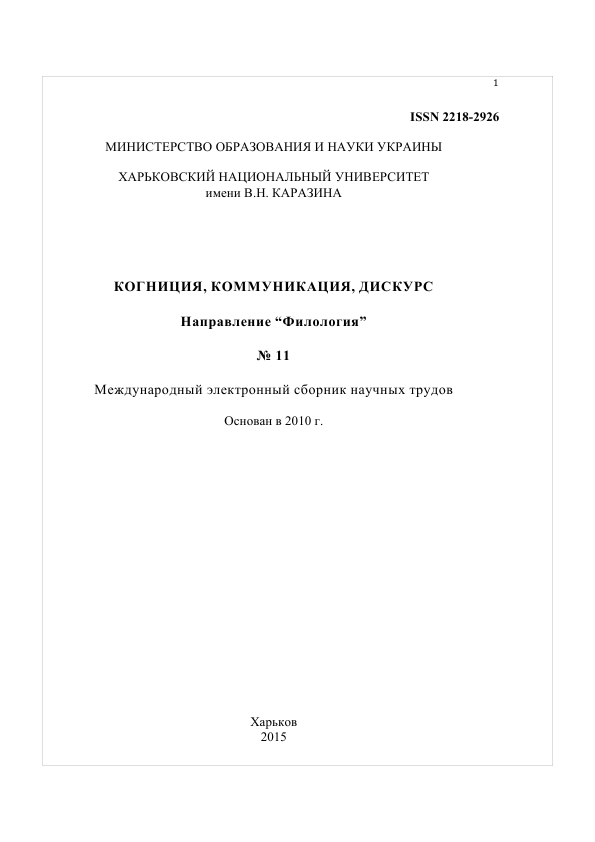Когнітивно-концептуальні особливості діалогу в формально-конверсаційних і прагматичних виявах
Анотація
В статті діалог усвідомлюється як багатошаровий концептуальний простір, пов'язаний з когнітивними контекстами інтерактантів як основними джерелами всеосяжної інтертекстуальності діалогу. Типологія концептів, що конструюють концептуальний простір діалогу, включає концепти категорійної ідентичності, концепти оперативної ідентичності, інтерактивні концепти, концепти-ідеї, жанровий концепт, соціосеміотичні концепти. Концепти виражаються або маркуються формально-конверсаційними і прагматичними засобами. Існують певні регулярні відповідності між концептуальними типами і формальними й прагматичними характеристиками діалогу, що індексують такі типи.
Завантаження
Посилання
Benwell, B., & Stokoe, E. (2006). Discourse and Identity. Edinburgh: Edinburgh
University Press.
Brockmeier, J., Carbaugh. (2001). Narrative and Identity: Studies in Autobiography, self and culture. Amsterdam: John Benjamins Publishing Co.
Brown, P., & Levinson. S.C. (1987). Politeness: Some Universals in language usage:
Politeness phenomena. Cambridge: Cambridge Univ. Press.
Davies, B., & Harrй, R. (1990). Positioning: The Discursive Production of Selves. Journal for the Theory of Social Behavior, 20 (1), 43-63.
Goffman, E. (1981). Response cries. Forms of Talk. Oxford: Basil Blackwell, 78-122.
Grice, H. P. (1975). Logic and conversation. Syntax and semantics, 3, 41-58.
Halliday, M.A.K. (1978). Language as Social Semiotic: The Social Interpretation of Language and Meaning. London: Edward Arnold.
Hausendorf, H. (2002). Social identity work in storytelling: Methodological remarks. Narrative Inquiry, 12 (1), 173–179.
Jefferson, G. (1972). Side sequences. Studies in social interaction, 294-338. Kravchenko, N.K. (2015). Integrativnyj metod I operativnyje metodiki dyscurs-analysa [Integrative method and operative technics of discourse-analysis]. Saabrukken: Palmarium LAMBERT Academic Publishing.
Kravchenko, N.K. (2012). Practicheskaja discursologyja: shkoly, metody, matodyky sovremennogo dyscurs-analysa [Practical discoursology: schools, methods and technics of modern discourse-analysis]. Luck: Volyn’polygraph.
Kravchenko, N. (2015a). Formal conversational and pragmatic properties of dialogue: to the question of correspondences. Problemy zistavnoji semantyky, 135-141.
Linehan, C., McCarthy, J. (2000). Positioning in practice: Understanding participation in the social world. The Journal for the Theory of Social Behaviour, 30 (4), 435-453.
McLean, K.C., Pasupathi, M., Pals, J.L. (2007). Selves creating stories creating selves: A process model of self-development. Personality and Social Psychology Review, 11, 262-278.
Potter, J., & Wetherell, M. (1987). Discourse and social psychology: Beyond attitudes and behavior. London: Sage.
Sacks, H. (1992). Lectures on Conversation. Oxford: Wiley-Blackwell.
Schegloff, E.A. (1996). Issues of Relevance for Discourse Analysis: Contingency in Action, Interaction and Co-Participant Context. Computational and Conversational Discourse: Burning Issues – An Interdisciplinary Account, 3-38.
Schegloff, E.A. (1999). Discourse, Pragmatics, Conversation, Analysis. Discourse Studies, 1(4), 405-435.
Schegloff, E.A. (2000). Overlapping Talk and the Organization of Turn-Taking for Conversation Language in Society, 29 (1), 63.
Searle, J. R., & Vanderveken, D. (1985) Foundations of Illocutionary Logic. Cambridge: Cambridge University Press.
Searle, John R. (1975). Indirect speech acts. Syntax and Semantics, 3: Speech Acts, 59-82.
Swan, D., & Linehan, C. (2001). Positioning as a means of understanding the narrative construction of self: A story of lesbian escorting. Narrative Inquiry, 10 (2), 403-427.
Van Dijk, T.A. (2008). Discourse and Context. A Sociocognitive Approach. New York: Cambridge University Press.
Van Dijk, T.A. (1997). The Study of Discourse. Discourse as Structure and Process. Discourse Studies: A Multidisciplinary Introduction, 1, 1-34.
Van Dijk, T.A. (2003). Ideology and discourse. A multidisciplinary introduction. Barcelona: Ariel.
Wetherell, M. (1998). Positioning and interpretative repertoires: Conversation analysis and post-structuralism in dialogue. Discourse and Society, 9, 387-412.
Zurcher, L.A. (1983). Social Roles: Conformity, Conflict and Creativity. London: Sage, Beverly Hills, CA.
Saul Bellow. (1970). Herzog. New York: Fowcett Crest Book.
Автори, які публікуються у цьому журналі, погоджуються з наступними умовами:
Автори залишають за собою право на авторство своєї роботи та передають журналу право першої публікації цієї роботи на умовах ліцензії Creative Commons Attribution License (CC BY), яка дозволяє іншим особам вільно розповсюджувати опубліковану роботу з обов'язковим посиланням на авторів оригінальної роботи та першу публікацію роботи у цьому журналі.
Автори мають право укладати самостійні додаткові угоди щодо неексклюзивного розповсюдження роботи у тому вигляді, в якому вона була опублікована цим журналом (наприклад, розміщувати роботу в електронному сховищі установи або публікувати у складі монографії), за умови збереження посилання на першу публікацію роботи у цьому журналі.
Політика журналу дозволяє і заохочує розміщення авторами в мережі Інтернет (наприклад, у сховищах установ або на особистих веб-сайтах) рукопису роботи, як до подання цього рукопису до редакції, так і під час його редакційного опрацювання, оскільки це сприяє виникненню продуктивної наукової дискусії та позитивно позначається на оперативності та динаміці цитування опублікованої роботи (див. The Effect of Open Access).




